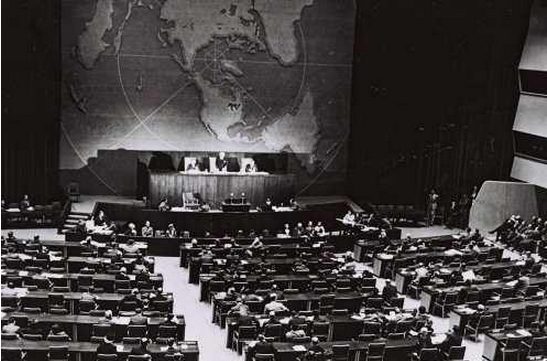U.N. Approves Partition Plan

November 29, 1947
The United Nations General Assembly passes Resolution 181 by a vote of 33-13 with 10 abstentions. The resolution recommends the creation of separate Arab and Jewish states in Palestine, linked by an economic union. This vote to partition Palestine gave the pioneers of the Zionist nation international legitimacy to establish a state, which came to fruition May 14, 1948.
The concept of partition plan was originally introduced in 1937 in the Peel Commission Report, which remained a viable political solution through the 1940s. In 1944, while still enforcing the 1939 White Paper’s restrictions against Jewish immigration and land purchase, British High Commissioner Sir Harold MacMichael wrote in a private letter to London, “I see no alternative to partition. … Jews and Arabs alike would enjoy the possession of their own respective territories.”
Facing increasing violence in Palestine, as well as deteriorating relations with the Zionists, the British turned to the newly created United Nations for help. In April 1947, the United Nations set up the U.N. Special Committee on Palestine (UNSCOP). Its purpose was to investigate the underlying causes for the persistent communal unrest and to make political recommendations about next steps. UNSCOP included 11 countries: Australia, Canada, Czechoslovakia, Guatemala, India, Iran, Netherlands, Peru, Sweden, Uruguay and Yugoslavia. In September, UNSCOP issued recommendations where a majority suggested a partition plan and a minority report suggested a federal solution of two communities living in one state.
Before the U.N. General Assembly adjourned Nov. 29, it appointed a five-member commission to implement the partition plan. The commission proved useless, thus adding to the growing chaos in Palestine, whereupon Britain withdrew its civilian administration in May 1948.